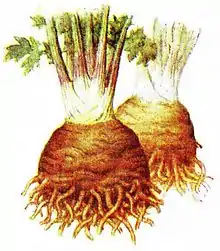Sellerie
See also: sellerie
German

Sellerie
Etymology
Borrowed from French céleri, from Lombard selleri, from Latin selīnum, from Ancient Greek σέλῑνον (sélīnon). Introduced in the 17th century as a culinary term; celery was unusual in German cuisine before that time.
Pronunciation
- IPA(key): /ˈzɛləri/
- IPA(key): /ˌzɛləˈri/ (southern variant)
- IPA(key): /ˈsɛlɐˌriː/, /ˌsɛlɐˈriː/ (Austria)
Audio (file)
Noun
Sellerie (when pronounced with initial stress) m (strong, genitive Selleries, plural Selleries or Sellerie) or
Sellerie (southern, especially Austria, and regionally elsewhere) f (genitive Sellerie, plural Sellerien)
Usage notes
- The form with initial stress is usually masculine, but may also be feminine depending on region and idiolect. The southern form with final stress is usually feminine.
- The plural is rarely used in any form.
Declension
Declension of Sellerie [masculine (when pronounced with initial stress), strong]
Declension of Sellerie [feminine (southern, especially Austria, and regionally elsewhere)]
Derived terms
- Knollensellerie (“celeriac”)
- Stangensellerie (“celery stalk(s)”)
- Staudensellerie (“celery stalk(s)”)
Descendants
- → Estonian: seller
Further reading
- “Sellerie” in Duden online
- “Sellerie” in Digitales Wörterbuch der deutschen Sprache
- “Sellerie” in Deutsches Wörterbuch von Jacob und Wilhelm Grimm, 16 vols., Leipzig 1854–1961.
This article is issued from Wiktionary. The text is licensed under Creative Commons - Attribution - Sharealike. Additional terms may apply for the media files.